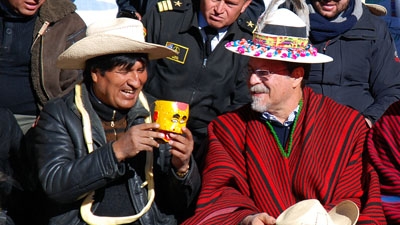Tuluy, meanwhile, expressed his satisfaction after the meetings held with other government representatives: “we agreed that the economic growth achieved by Bolivia in recent years can create a situation of wellbeing from which citizens can benefit following a greater social inclusion of the most vulnerable”, he said.
This year, despite the uncertainty of the global economy, this growth is expected to be around 4%.
Partners and Allies
After his meeting with Morales, Tuluy visited the Rural Partnerships Project Fair, an initiative financed by the World Bank and carried out by the Rural Development Ministry.
The project links technology and knowledge to improve the quality of produce and increase the income of rural workers through a renewed access to markets. It has benefited approximately 800 production partnerships and 30,000 beneficiary families since it began in 2007.
Hasan Tuluy also visited other World Bank projects such as La Paz True Neighborhoods and Communities and the El Alto Open Air Youth Art Gallery, where he had an extensive dialogue with beneficiaries of these initiatives.
The World Bank senior official also met representatives from the private sector and multilateral and bilateral donor agencies, in order to articulate the World Bank’s vision with respect to the opportunities and challenges faced by Latin America and Bolivia in particular.
Every one of these meetings allowed him to get acquainted with different points of view and opinions on how to improve the support of the World Bank for Bolivia’s development, and doing so in a way consistent with the Bolivian model and the country’s priorities.
“I want to show that the World Bank is a trustworthy partner for the Plurinational State of Bolivia on issues pertaining to its development and poverty reduction objectives. During my encounters with President Morales, the Ministers of Finance and Planning, among others, I sought to strengthen our relationship of cooperation even further,” Tuluy added.
Inclusion and Equality
The World Bank portfolio in Bolivia includes 13 investment projects totaling approximately US$450 million. The partnership between the country and the Bank is based on 4 pillars:
— Sustainable Productive Development;
— Climate Change and Disaster Risk Management;
— Human Development; and
— Access to basic services and support for public sector efficiency.
The multilateral institution recognizes that social inclusion and equality of opportunities for indigenous people are crucial for Bolivia’s development. In that context, it offers financing services, specialized knowledge and global expertise adapted to the country’s needs and priorities.


